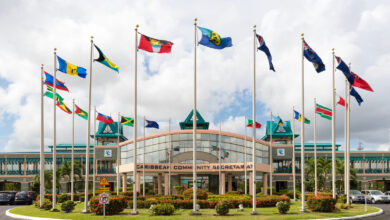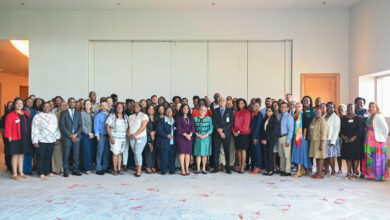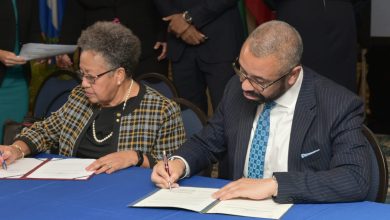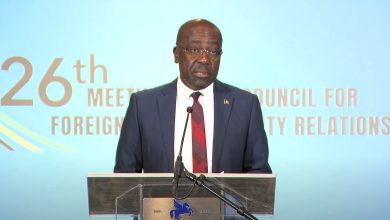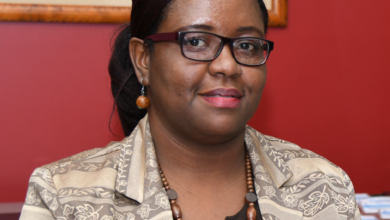It is my pleasure to address this gathering of stakeholders at this Justice For All consultation. Senator Mark Golding, we are happy that you were able at short notice to take the place of Prime Minister, signifying the importance the Government of Jamaica places on the issues of human rights and the struggle to achieve an AIDS free generation. I wish to take this opportunity to thank the UN Secretary General Special Envoy for HIV/AIDS in the Caribbean, Professor Edward Greene for following up with PANCAP and UNAIDS on my request to expedite the programme which focuses on the human rights agenda and for taking the lead in implementing the series of national consultations leading up to this event tonight. I also wish to congratulate the Director of the PANCAP Coordinating Unit, Mr. Dereck Springer and his staff for conceptualizing and rolling out the elements of the Justice for All programme that will be the focus of discussions over the next two days. My commendations also go to UNAIDS for its unstinting leadership and support as well as to the Jamaican Government and the local coordinating Team in collaboration with the PANCAP Coordinating Unit and the Global Fund for the excellent arrangements put in place for this consultation and for their gracious hospitality.
This meeting is taking place at a time when attention is being given to the place of HIV and AIDS in the post 2015 development agenda. It also coincides with the period of transition that leaves us with approximately 650 days to achieve the targets associated with the millennium development goals. Based on all indicators, despite significant accomplishments, HIV will be an unfinished goal and there is ample justification for AIDS to find a prominent place in the post 2015 development agenda. This justification ushers in a new approach that promotes AIDS as a catalyst for sustainable global health.
Ten years ago in collaboration with PANCAP and the UK Department for International Development (DIFID), my Government hosted a regional conference in St Kitts and Nevis under the theme Champions for Change. There was great optimism at that time about moving forward with an agenda to help to accomplish significant advances toward the reduction of Stigma and discrimination. We anticipated that a Stigma and Discrimination Unit, funded by DFID would have assisted the region in identifying the major bottlenecks with emphasis on behavioral research. It is with a great sense of disappointment that we are back to the drawing board today. Fortunately we are not starting from scratch. We now have held several consultations, issued reports, made countless recommendations and generated greater emphasis and awareness and even witnessed a greater display of tolerance on which to draw. The national consultations that have focused on an agreed concept and outcome have no doubt paved the way for positive results.
WE NEED RESULTS. IT IS INDEED TIME FOR ACCELERATED ACTION.
As we prepare for the engagement leading up to a Justice for All roadmap at the end of this consultation, there are significant lessons on which we can draw;
First, It is after all due to the AIDS activists rooted in the civil society organizations that advocated for a more equitable response to treatment as a human right that has benefited the over 15 M people throughout the world, with access to affordable medicines. In the Caribbean today, approximately 50 percent of people living with HIV have access to ARVs compared with 10 percent a decade ago.
Second, in our case it is important to recognize the role of that noble band on Ministers of Health which included our present CARICOM Assistant Secretary General Slater who with the support of UNAIDS and PAHO, under the banner of PANCAP successfully negotiated with pharmaceuticals in 2002 to obtain massive reductions in the cost of drugs. This started a worldwide trend. Yet our work in treatment must be accelerated if we are truly to get to an AIDS generation.
Third, it was due to the unique mechanisms of the Global Fund established in 2001, subsequently with support from PEPFAR and other development partners that contributed in no small measure to the accelerated programmes leading to spectacular reductions in prevalence rates and to deaths from AIDS.
Fourth, due to the accelerated treatment and prevention regimes, we in the Caribbean could aspire to be the first region in the World to eliminate mother-to-child transmission of HIV by 2015.
Fifth, there is clear evidence that broadening strategic partnerships designed to increase access to education, health and social protection services are social drivers that contribute toward ending AIDS as well as extreme poverty. Indeed this is the type of new approach for development cooperation that will inspire regional positions on AIDS and health in the post 2015 era. This suggests the need to focus on the elimination of inequalities and social justice that are essentially the concerns of this consultation, over the next two days.
Sixth, is the emphasis that must be placed on research – combining medical and behavioral approaches– to assist policy makers to make the case for investing in reducing HIV related stigma and discrimination. Of relevance to this meeting is the reference made by the UNAIDS Deputy Executive Director to the World Bank studies showing the relatively high costs of homophobia.
And so to support activism, coordinated negotiations, sustainable financing mechanisms, accelerated treatment and prevention regimes, and attention to social drivers and research are general issues from past experiences that must be now taken into consideration in designing our Roadmap in going forward.
So what really are the elements of a Justice for All Roadmap:
[Ladies and Gentlemen] Permit me therefore to share some thoughts that you may wish to consider as part of this conversation.
Stigma and Discrimination is one of the most challenging issues that could erode the gains in the AIDS response and prevent achieving the goal of “ending AIDS” Hence among number of special elements in any roadmap let me identify six (6) for your consideration:
1. Emphasising shared responsibility especially to increase sustainable investment in the AIDS response as a partnership among the private sector, governments and CSOs This is aimed at increasing country ownership of the response as well as sustained global support, especially to support programmes for the vulnerable and most in need population or affected groups in both low and middle income countries in which most of the Caribbean now fall.
2. Increasing community involvement in policy development and implementation, strengthening partnerships and promoting social protection systems so as not to “leave anyone behind”.
3. Increasing awareness of human sexuality through highlighting policies on social and reproductive health and rights utilizing appropriate national regional and international models. In the case of the Caribbean, perfecting the health and family life education programmes and making them age appropriate
4. Identifying those programmes that can best bring about gender equality and ensure that they engage both male and female. In this regard, pay particular attention to eliminating violence against women and girls which is horrendously high in the Region and is associated with the increasing HIV prevalence among young women
5. Actively promoting and identifying the processes for reducing and eliminating those laws that actually contribute to discrimination on the basis of gender, race and sexual preferences, and those that particularly infringe the rights of the LGBT communities.
6. Identifying creative leadership and “champions” of the Justice for all”. And here I wish to challenge and embrace the process among the various clusters of faith leaders, parliamentarians, private sector and CSOs and young people, with emphasis being placed on nurturing youth leadership across all clusters
Hopefully this Regional consultation will find this sketch as a useful contribution to the ultimate goals of sustaining AIDS in the post 2015 development agenda and removing the barriers in policies, laws, values and behaviour that are spoilers in the march toward social justice. The aim is to sponsor a life of dignity for all as the overall basis for “justice for all”.


